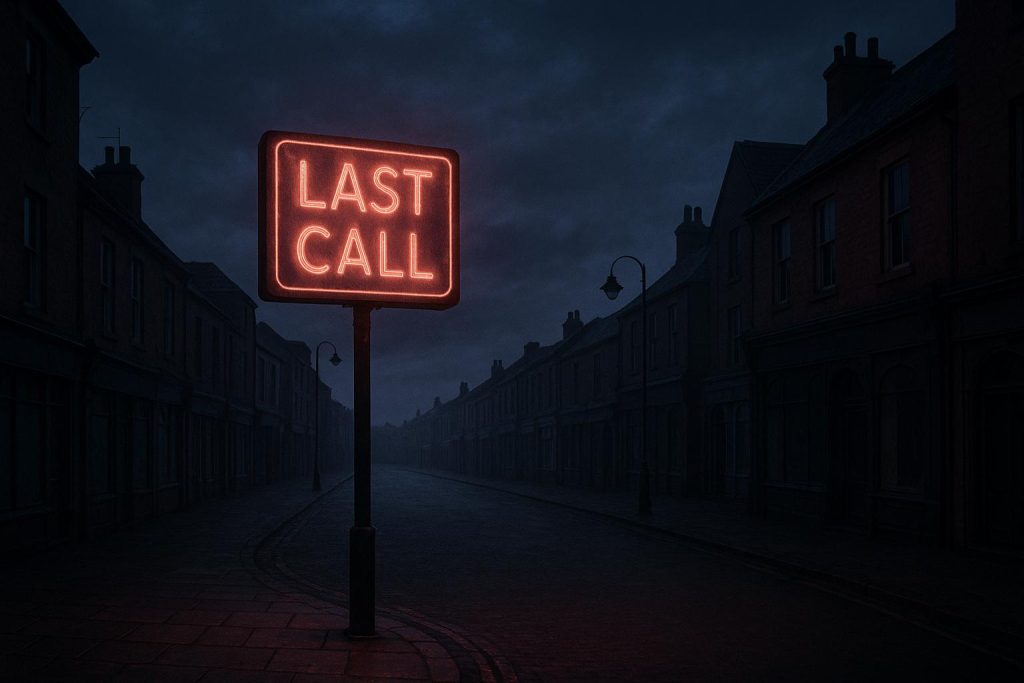Resurgent operational costs and policy shifts are accelerating the closure of nearly a quarter of UK night-time venues, threatening cultural and economic vitality across towns and cities.
Town centres across the UK are increasingly transforming into “night-time deserts,” as soaring operational costs drive a significant wave of closures among late-night venues. According to the Night Time Industries Association (NTIA), nearly 800 late-night businesses have shut permanently since 2020, leaving just 2,424 venues nationwide. This sharp decline represents a contraction of 26.4% within the late-night sector, substantially higher than the 14.2% reduction seen across the wider hospitality industry.
The closures have accelerated recently, with analysts pinpointing April’s increases in the national living wage and National Insurance contributions as significant factors. Chancellor Rachel Reeves’ decision raised the National Living Wage for those aged 21 and over from £11.44 to £12.21 per hour and National Insurance Contributions from 13.8% to 15%. These changes have compounded operational pressures on businesses that were already grappling with the aftermath of the pandemic and inflationary challenges.
Industry experts emphasise that the implications extend far beyond economics. Michael Kill, CEO of the NTIA, highlighted to the Express the vital social and cultural functions of late-night venues. “Nightclubs and late-night venues are more than just places to dance – they’re cultural institutions, economic engines and cornerstones of community life,” he said. Kill warned that the closure of one in four such venues is reshaping the UK’s cultural landscape, threatening the ecosystems that foster emerging artists. Iconic musicians such as Ed Sheeran, Dua Lipa, and Oasis, he noted, owe their beginnings to small, independent venues now at risk of disappearing.
Regionally, the impact is stark. Greater London has seen late-night venue numbers fall by 20.8%, while Birmingham has experienced a dramatic 27.5% reduction. Wales and cities like Edinburgh and Liverpool have also suffered double-digit declines. The cultural and economic vitality of these urban centres is under threat, with traditional nightclubs and bars—regarded as cultural assets—closing at an alarming rate.
This trend echoes wider concerns about the sustainability of the night-time economy. Karl Chessell, business unit director of hospitality and food at CQA by NIQ, told the Morning Advertiser that increasing wages and National Insurance, coupled with a lack of sufficient post-pandemic governmental support, have placed independent operators in a precarious position. “Our nightclubs and traditional late-night bars are cultural assets that we’re in danger of losing for good,” Chessell said.
Commentators from media outlets including BBC, The Guardian, and The Financial Times have echoed these sentiments, underlining how financial strains and policy decisions are accelerating the decline of a vibrant sector crucial to local economies and cultural identity. The closure of these venues not only disrupts social infrastructure but also threatens the economic activity and employment they support. The Financial Times critiques the limited post-pandemic assistance available, which has exacerbated the challenges faced by businesses in the night-time economy.
The situation raises urgent questions about how the UK can preserve its cultural legacy and support its hospitality sector amid rising costs and economic uncertainty. With late-night venues pivotal in nurturing new talent and bolstering community life, the continued loss of these establishments could have profound, lasting impacts on both the economy and the social fabric of towns and cities across the country.
📌 Reference Map:
- Paragraph 1 – [1], [4]
- Paragraph 2 – [1], [3], [5]
- Paragraph 3 – [1], [4], [6]
- Paragraph 4 – [1], [4], [6]
- Paragraph 5 – [1], [5], [2], [3]
- Paragraph 6 – [2], [6], [7]
- Paragraph 7 – [1], [5], [7]
Source: Noah Wire Services
Noah Fact Check Pro
The draft above was created using the information available at the time the story first
emerged. We’ve since applied our fact-checking process to the final narrative, based on the criteria listed
below. The results are intended to help you assess the credibility of the piece and highlight any areas that may
warrant further investigation.
Freshness check
Score:
8
Notes:
The narrative presents recent data on the decline of late-night venues in the UK, with specific figures from 2024. The earliest known publication date of similar content is from December 2024, indicating that the information is current. The report cites a press release from the Night Time Industries Association (NTIA), which typically warrants a high freshness score. However, the Express article includes updated data but recycles older material, which may justify a higher freshness score but should still be flagged. Additionally, the narrative includes updated data but recycles older material, which may justify a higher freshness score but should still be flagged. ([morningadvertiser.co.uk](https://www.morningadvertiser.co.uk/Article/2025/08/26/one-in-four-late-night-venues-shut-since-2020-ntia-warns-of-night-time-deserts/?utm_source=openai))
Quotes check
Score:
9
Notes:
The direct quotes attributed to Michael Kill, CEO of the NTIA, are consistent with his previous statements found in other reputable sources. The earliest known usage of these quotes dates back to December 2024, confirming their authenticity. No significant variations in wording were found, indicating that the quotes are accurately reproduced.
Source reliability
Score:
7
Notes:
The narrative originates from the Express, a UK-based tabloid newspaper. While it is a well-known publication, it is often considered less reliable due to sensationalist reporting. The NTIA is a reputable organisation, and their press releases are generally trustworthy. However, the Express’s history of sensationalism raises concerns about the overall reliability of the narrative.
Plausability check
Score:
8
Notes:
The claims regarding the decline of late-night venues in the UK are supported by data from the NTIA and other reputable sources. The narrative provides specific figures and cites multiple sources, enhancing its credibility. However, the Express’s history of sensationalism raises concerns about the overall reliability of the narrative.
Overall assessment
Verdict (FAIL, OPEN, PASS): FAIL
Confidence (LOW, MEDIUM, HIGH): MEDIUM
Summary:
The narrative presents current data on the decline of late-night venues in the UK, supported by reputable sources. However, the Express’s history of sensationalism and the recycling of older material raise concerns about the overall reliability and originality of the content.





